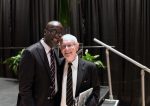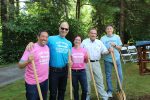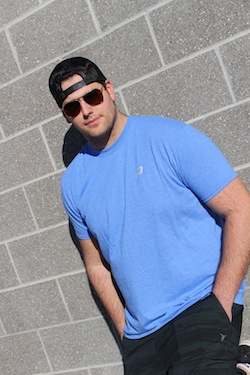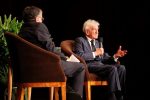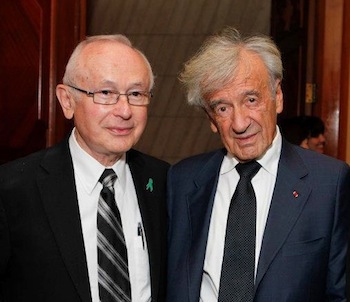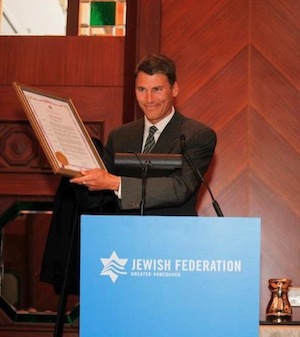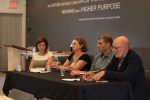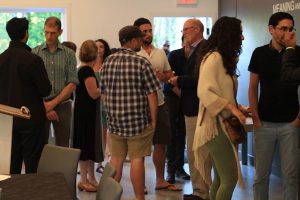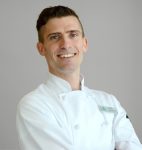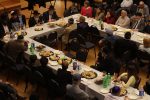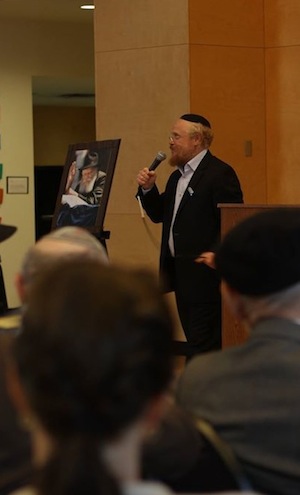Éloge Butera, a survivor of the genocide against the Tutsis of Rwanda, and Robbie Waisman, a survivor of the Holocaust, at Vancouver Holocaust Education Centre’s gala event on May 26. (photo from VHEC)
For the Vancouver Holocaust Education Centre, the first half of 2016 has been a time of intense activity, though the pace of contemporary events has been accompanied by a very conscious reflection on both the past and the future of the organization.
The VHEC held its first gala-style event in more than a decade on May 26, a dinner and program titled “Looking Back, Moving Forward.”
“The event was very deliberately intended to recognize that the organization is at a moment of profound significance,” said Nina Krieger, VHEC executive director. “We took the opportunity to reflect on the past, show our gratitude to those who founded and led the organization, and to take pride in the achievements we have had. But the program was also quite emphatically focused on the future. The VHEC began as a small organization and we have grown dramatically in size and impact, in the depth and breadth of the programs we deliver, and it was our intention to illustrate both of these profiles to the nearly 500 people who attended.”
Co-chaired by Marie Doduck, Helen Heacock-Rivers and Shoshana Lewis, “Looking Back, Moving Forward” intended to give guests a taste of what more than 25,000 British Columbia students experience every year through VHEC programs. Annually, a symposium on the Holocaust takes place at the University of British Columbia. An additional 12 symposia take place in school districts throughout Metro Vancouver. Each of these is an opportunity for students to learn about the Holocaust from an historical perspective, view a film on the subject and then meet and hear the testimony of a survivor.
“The symposia are undoubtedly the most impactful thing we do,” Krieger said.
“We have thousands of letters from students telling us about the life-changing impact meeting a survivor has had on them,” she explained. “We have classes brought to our symposia by teachers who chose their profession because of the impact of a symposium they attended years earlier.”
In a moving moment at the gala event, Caden Dorey, a Grade 11 student from Surrey, read aloud a letter he had sent to survivor speaker Lillian Boraks-Nemetz after he met her at a symposium.
“I have never been so moved in my life,” he wrote. “You have changed my perspective on the Holocaust, and life itself.… I will never forget you, and thank you for letting me share this moment with you. I’m forever impacted by this day.”
The centrepoint of the evening was a joint presentation by Robbie Waisman, a survivor of the Holocaust, and Éloge Butera, a survivor of the genocide against the Tutsis of Rwanda. Both spoke of the importance of sharing their survival stories and the influence it has had on students and others.
Waisman explained that it is difficult to help young people comprehend the idea that 1.5 million Jewish children were murdered in the Holocaust, so he tells the story of his nephew, Nathan. Waisman was only 8 years old when his older brother Haim and his wife Golda had Nathan. Waisman spoke of his pride on being an uncle, but the Holocaust destroyed their family.
“Nathan was not yet 3 years old the last time I saw him,” Waisman said. “His mother Golda could have easily gone to work in the ammunition factory after the Nazis established the ghetto, but she would have had to give up her little Nathan. She refused to be separated from her little boy and so was sent to the Treblinka gas chambers with him.”
Butera credited Waisman for inspiring him to speak up about his experiences and devote himself to confronting racism and the potential for genocide.
The evening, which was emceed by Dr. Art Hister, also represented the increasing engagement of younger members of the community in VHEC’s work. Children and grandchildren of survivors, as well as others of their generations, were involved in the planning committee and Katia Hessel, a granddaughter of four survivors, spoke about the obligation she feels for carrying on the memory of her family’s history.
While not lining up exactly with the calendar, the VHEC gala event marked three significant milestones. It is more than 40 years since the first symposium on the Holocaust for high school students took place. It is about 30 years since the society that created the centre was founded. And it is more than 20 years since the centre first opened its doors as a teaching and research museum. Honorary chairs of the event were the four past-presidents of the organization: Robert Krell, Waisman, Rita Akselrod and Jody Dales.
Passing the torch of Holocaust memory from one generation to the next has been central to the Holocaust centre’s work recently.
“The greatest single challenge we face is continuing to maintain the relevance of our mission and mandate in a post-eyewitness survivor era and I think we are well-positioned to do that,” said Ed Lewin, who retired after six years as president of the VHEC board at the annual general meeting a week after the gala.
The centre is undertaking a major project of digitizing the archival collections, which will make them accessible worldwide. The process of digitization will also allow the centre to integrate historical materials seamlessly into pedagogical materials for use by teachers locally and wherever educators are seeking supplementary classroom resources.
“We are finding a way to keep the students, who are our audience, enthused and energetic and interested in hearing about stories without actual eyewitness survivors to tell it to them,” Lewin said.
For visitors to the centre, planned upgrades will make artifacts and some of the archival materials more accessible, including through interactive electronic kiosks and visible display units.
Lewin was honored at the AGM with a life fellowship in the VHEC, as was Jack Micner.
Phil Levinson, who succeeded Lewin as president, said he intends to continue to ensure that the VHEC’s mission is met as the number of eyewitnesses to the Shoah declines.
“We have to plan for the time when we don’t have someone standing on the stage who was there,” he said. “It’s going to be easier to deny [the Holocaust] and it’s going to be harder to have an impact live. I would see that, for me and the president after me, as the biggest challenge and the most important challenge.”
While there may be a perception that working in the field of Holocaust remembrance and education is a sad or depressing vocation, people associated with the Holocaust centre say it is quite the opposite. Levinson said watching the reaction of students, who frequently mob survivor speakers and hug them at the end of a symposium, is uplifting. Such reactions demonstrate the power of the program, Levinson said.
“You see what’s happening in that room over the few hours of the symposium, and you look at all the different types of people that are in there that leave unified,” he said. “There are 1,000 people who have a better chance of going out in society now and not being racist and not tolerating it and not turning the other way. That is super-rewarding. That is why I do it.”
Pat Johnson is a communications and development consultant for the Vancouver Holocaust Education Centre.

